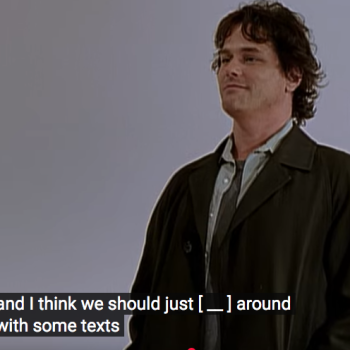Gene Wilder told a story about meeting Cary Grant shortly after Wilder’s 1978 movie Silver Streak was released.
“Tell me something, will you?” Grant said. “Was your film in any way inspired by North by Northwest?”
Wilder told him that, yes, it was, that screenwriter Collin Higgins intended it as a tribute to one of his favorite movies.
“I thought so,” Grant said to him. “It never fails! You take an ordinary chap like you or me put him in trouble way over his head, and then watch him try to squirm out of it. Never fails!”

Wilder got a lot of laughs telling that story because Cary Grant never seemed to be an “ordinary chap.” But Grant’s main point still stands: Audiences love this story.
I love this story.* North by Northwest is one of my favorite movies and many of my other favorite movies are North by Northwest. I love stories in which an innocent person gets embroiled in an international scheme, in which an unassuming “ordinary chap” unwittingly ends up in trouble way over their head and has to squirm their way out of it.
Alfred Hitchcock loved this story too. He told it in North by Northwest with Grant’s advertising executive getting mistaken for an (imaginary) spy, with Joel McCrea’s reporter getting tangled up in an assassination plot in Foreign Correspondent, with Margaret Lockwood’s socialite encountering a fascist conspiracy in The Lady Vanishes, with Paul Newman as a scientist pursued by the East German secret police in Torn Curtain, and with Jimmy Stewart and Doris Day’s vacationing family getting mixed up in espionage in The Man Who Knew Too Much.
All of those films inspired tributes and imitations like Silver Streak — with Gene Wilder’s book editor running afoul of a forgery network, or Do Not Disturb in which a mute child witnesses a murder in Amsterdam at the hotel from Foreign Correspondent, or The Man Who Knew Too Little (in which Bill Murray doesn’t even realize he’s tangled up in an international conspiracy).
But Hitchcock’s many films also spawned an entire genre of movies and TV series based on this same premise of an everyday innocent person abruptly embroiled in some international scheme. I’ve enjoyed them all: Charade, Blow Out, Enemy of the State, Into the Night, The Man With One Red Shoe, Jumpin’ Jack Flash, The Fugitive, Wanted, The Marathon Man, The In-Laws, Adventures in Babysitting, Chuck, The Wrong Mans, The Night Agent, Head Over Heels, Foul Play, Three Days of the Condor, Ghosted, The Big Lebowski, etc., etc.
Writing these stories involves overcoming at least two obstacles. The first is the instigating factor: How does your protagonist wind up tangled up in this scheme? The second involves forcing them to work this out by themselves by explaining why they can’t just call the police.**
The writers of those stories listed above all worked hard to come up with clever solutions to both of those problems. But here’s the good news: It’s 2025 and you no longer need to work hard or to be clever to do either of those.
Writing a Hitchcockian thriller is easy now. This is a grim silver lining of having an authoritarian regime in power that is simultaneously massively corrupt and astonishingly inep — both cartoonishly evil and buffonishly incompetent.
Just consider the “Signalgate” affair. This involved a dozen high-level administration officials — including the vice president and a half-dozen cabinet secretaries — violating law and protocol by discussing classified military secrets on a commercial app with their personal phones. And — on top of that — it turns out that their illegal secret group-chat wasn’t even secret because they had accidentally included a journalist, Atlantic editor Jeffrey Goldberg, who reported on the whole thing.
Initially, Goldberg posted only cryptic references to the classified war plans discussed in front of him on that group-chat, but after participants tried to defend their negligence by insisting that nothing they discussed was actually classified, Goldberg just straight-up published his transcript of the whole thing.
Here you have the premise for a dozen different Hitchcock-style thrillers. How does your protagonist get tangled up in international conspiracies and espionage? Simple: They are mistakenly included on a group-chat amongst the conspirators.
Six months ago such a premise would have been laughed off as implausible or impossible. But now we know this is a thing that can happen.
And because we now know that this is a thing that can happen and that has happened, any other seemingly implausible set-up for sich a plot has to be treated as a legitimate possibility.
Consider, for another example, the recent phone call between the president and retired H.R. McMaster, who served as a national security adviser during the first Trump administration, was fired soon after, and then became an outspoken critic of the president:
Just over a month ago, retired Lt. Gen. H.R. McMaster received an unexpected call on his personal cell, four sources told CBS News. It was from the White House and he was instructed by the voice on the other end to stand by for the president.
.. “Henry…” is how Trump opened the call before launching into the conversation, according to two sources who were not authorized to discuss private conversations.
It was then that McMaster knew this familiar voice was indeed Mr. Trump. But he also realized something else: the commander-in-chief had not intended to call him at all.
McMaster goes by H.R., short for Herbert Raymond. Not Henry.
“Mr. President, this is H.R. McMaster,” he said into the phone.
“Why the f*** would I talk” to H.R. McMaster? Trump asked dismissively, and then Trump launched into a scathing critique of his former aide, two sources said.
The call was brief.
So, yeah, you could have your Everyman or your Jane Q. Public be accidentally included in a group chat. Or you could have them simply answer the phone on the receiving end of a wrong-number from an angry and addled president. And now they Know Too Much and they can’t go to the police and have to go on the run, etc.
Or consider this story: “Homeland Security Secretary Kristi Noem’s bag, including $3,000 in cash, is stolen from DC restaurant.”
Department of Homeland Security Secretary Kristi Noem fell victim to a thief while eating dinner at a downtown Washington, DC, restaurant Sunday night, the secretary confirmed Monday. …
The Secret Service, which provides security for Noem, reviewed security camera footage at the Capital Burger restaurant and saw an unknown white male wearing a medical mask steal her bag and leave the restaurant, a law enforcement source said.
The thief got away with Noem’s driver’s license, medication, apartment keys, passport, DHS access badge, makeup bag, blank checks, and about $3,000 in cash.
It’s possible this was the work of some petty thief who lucked out by finding someone who was both oblivious about her purse and carrying large amounts of cash. It’s also possible this was the work of some foreign intelligence agent who reasonably suspected that the American DHS secretary might be carrying the kind of intel it’s their job to acquire.
For a Hitchcock-style thriller, I’d go with the former and make our protagonist a small-time thief who can’t believe his good fortune scoring $3,000 in cash. But then — alas — he gets greedy and realizes he could make even more money by selling Noem’s personal data and/or possible state secrets to the highest bidder. Our small-time thief would thus end up with agents from every spy agency on the planet gunning for him.
Again, no respectable producer would have accepted such an outrageous premise as recently as three months ago. I mean, come on, it just sounds ridiculous. But now it just sounds realistic because it’s actually real.
At this point I think it’s safe to say that any lazy, absurd, ridiculous-seeming premise for how the evil conspirators wind up accidentally revealing their plot to the protagonist has to be acceptable as a real possibility. Go ahead and try to come up with some plot device that seems too incompetent or too recklessly dumb for the current administration. I don’t think you can.
The only real difficulty now is coming up with some nefarious conspiracy that they’re not already openly and publicly pursuing and posting about in ALL CAPS on Truth Social. That’s the biggest plot hurdle nowadays for writing a Man Who Knows Too Much storyline. These days, we all Know Too Much.
* I recognize that my enjoyment of these stories is a confession of sorts. As I’ve written here before:
I’m susceptible to the appeal of this story, which is based in part on the flattering notion that its every-person hero is just like me (and you, too). At the beginning of the story, this hero — your surrogate and mine — is adrift with unrealized and unrecognized potential. But then fate intervenes and by the end of the story, with a bit of luck and pluck, our hero is a hero indeed.
The insidious appeal of that is to reassure us that we’re not necessarily the unsuccessful under-achievers we may otherwise appear to be. We’re just waiting for that twist of fate that will force us to rise to the occasion, proving our worth to the world.
To paraphrase Conor Oberst, it’s better to be working for a paycheck then waiting around hoping to win the lottery.
** There has always been another simple and obvious solution to the plot-problem of Why Don’t They Just Call the Police? Just make the protagonist someone that the police will automatically treat as guilty even if proven innocent — someone they will automatically, and violently, suspect is intrinsically criminal. In other words, just make your protagonist not white.
















